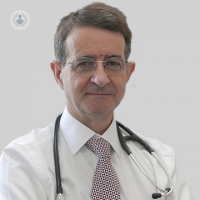How do I know my breathing is abnormal?
Written in association with:Most of the time we’re not aware of our breathing – so when something feels wrong, it can be very frightening. But how do we know there’s an underlying problem? We asked Dr John Gerry Coghlan, leading consultant cardiologist at the Royal Free Hospital London with a specialism in hypertension and chronic breathlessness.

Knowing your breathing is abnormal is not entirely straightforward.
We're not normally conscious of our breathing – we just breathe that and we don't think about it. But one can become aware of your breathing fairly easily and we do this in everyday life.
For example, now that you are reading about breathing, you're probably aware of your breathing. If you run for a bus and this is not a normal level of exercise for you, you usually become quite conscious of your breathing if you do something like that.
Responding to abnormal situations
One can also become aware of their breathing because you're in an abnormal situation, which can be quite a frightening thing to experience but not necessarily an indication of an underlying problem.
If you're running for your life, you actually use up or exceed the ability of your heart and lungs – even though they're perfectly normal – to get oxygen to your muscles. So you can become very distressed and quite frightened and feel that you're dying from lack of breath, in situations like that.
We also have a very powerful instinct that if we’re very fearful, we become very aware of our breathing. So if you have to try to hide from bad people or bad animals or something of the kind, you can become very aware of your breathing because you're frightened. This can cause confusion, obviously – if anxiety can cause breathing problems or awareness of your breathing, you can equally, because of your breathlessness, become very anxious. Knowing which is the chicken and which is the egg in that situation can take someone unpicking.
So what would suggest an underlying problem?
The most obvious abnormal situation is sudden or rapid onset acute breathlessness.
This is where over a period of minutes or days you become very distressed by your breathing. And this can be very obvious. You can feel that there's a tightness in your chest that you can't expand your lungs. You can feel that you're suffocating or you can become panicked by your breathing.
All of those could be signs that there's something really significant going on. But it’s still possible that you’re simply aware of your breathing being heavy because you have a bad cold.
The more subtle one is what we call chronic breathlessness. This is something that's happened over weeks or months where you've lost the ability to exercise normally. Something that you've been able to do last year, you can no longer do because the breathing stops you.
Being aware that the breathing stops you is the difficult bit. We have a natural tendency to try and reduce our level of exercise so that we don't become breathless. As a result, you might just feel that you’re getting unfit. It's sometimes only after you query and dig into the reason why somebody is not exercising that you find they're doing that to avoid become breathless. This is when we would investigate further.
To book a consultation with Dr Coghlan, click here.


